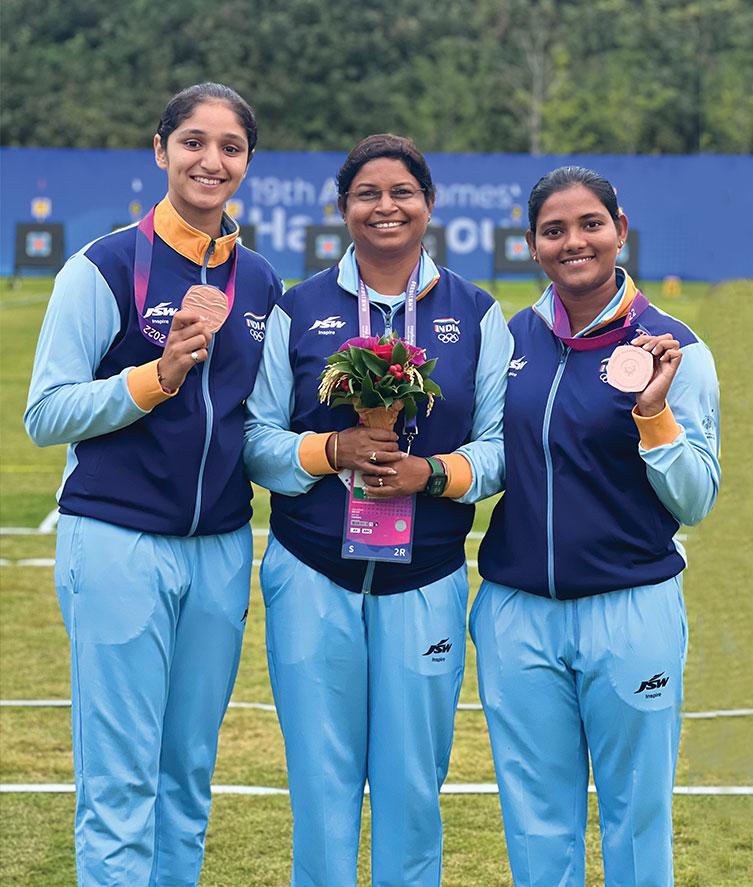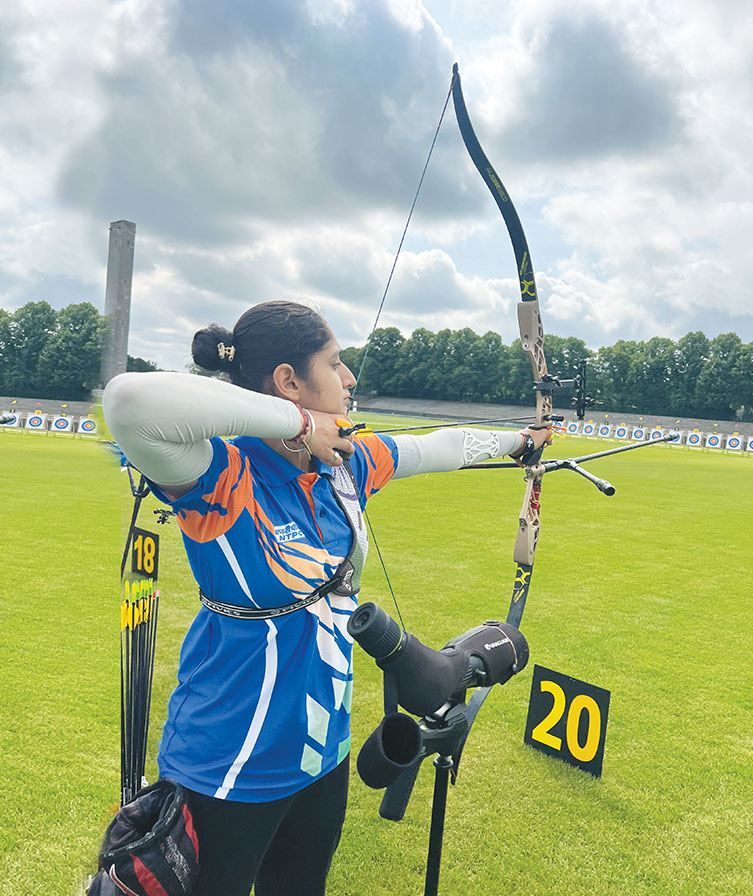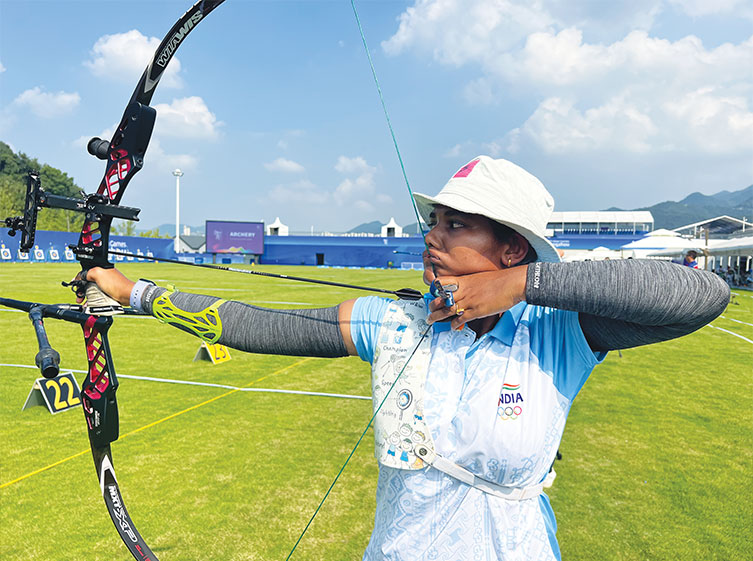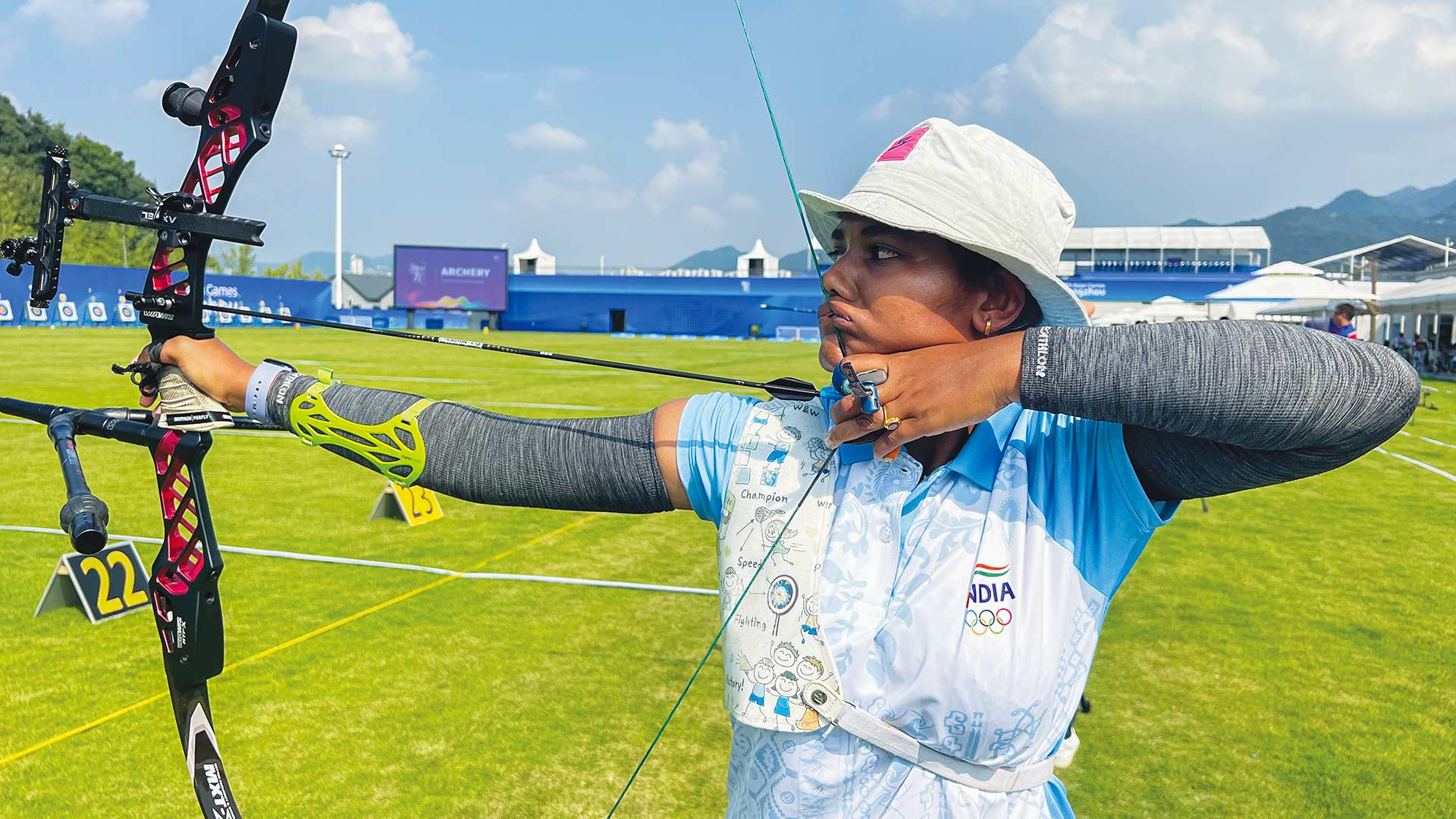March 2024 | 1233 words | 5-minute read
A 13-year wait came to an end on October 6, 2023, when the Indian women’s recurve archery team clinched the bronze medal at the 19th Asian Games. For Ankita Bhakat and Bhajan Kaur, two of the three-member recurve archery team, the win, after a 2-6 loss to South Korea in the semifinal, was a proud moment.
“It was a really happy moment for us!” says 25-year-old Ankita Bhakat, the most experienced member of the team. “The team’s performance had not been good the entire year, so no one had any hope of us winning. I told the girls that this meant there was no pressure on us and that we should perform without fear, maintaining the same approach we adopt during our practice sessions. We kept talking to each other, encouraging each other to divert our minds and counter the fear.”
This guidance proved crucial for 18-year-old Bhajan Kaur while taking the last shot that helped the team clinch the win. “All I was thinking was that I must give it my best shot, the way I do during practice,” says Ms Kaur. “I blocked the thoughts that increased the pressure and just decided to give my best shot. Releasing the winning shot was a happy moment for me, especially because we had been waiting for so many years for a win!”
For both archers, the win at the Asian Games was the culmination of a promise they had made to themselves, while training at the Tata Archery Academy (TAA), to not go home empty-handed from the tournament.

Starting off
Despite hailing from different parts of the country — Ms Bhakat is from West Bengal and Ms Kaur from Haryana — both encountered archery at a young age and were encouraged to take it up professionally. Ms Bhakat was fascinated by the sport after seeing an archery competition in her hometown of Kolkata. She began training at the age of 12 under the guidance of her father, an avid sports fan, and local academy coaches, before getting selected by TAA in 2014 and moving base to Jamshedpur.
Ms Kaur, on the other hand, started off as a shot-put player. “Back in 2018, I saw a few students practising archery at my school, tried it out and instantly liked it,” she says. “In my initial years, I trained under several coaches, but my father taught me the most. He would watch videos of tournaments, other players and coaches to understand techniques and help me better my game. My father is a farmer, and he put up a target in our fields so that I could practise often.” The practice helped and she had her first win — three golds at the School Games Federation of India Nationals Under-14.
Bhagwan Singh, Ms Kaur’s father, makes it a point to attend all her tournaments within the country. “It really makes a difference when the one who has coached you in the beginning observes you,” she says. “He is aware of all my little mistakes and continues to guide me.”

Coaching dreams
While their fathers played a pivotal role in shaping both archers’ skills, the formal instruction they received at TAA from some of the country’s best coaches has honed their innate talent and forged their career paths. “I came to know about TAA at the World Youth Championships Trial in 2021 and joined the academy. Training with world class coaches and players and the emphasis on discipline and a routine has made me more efficient,” says Ms Kaur, who is training under South Korean coach Lim Chae Woong at TAA. Shortly after joining the academy in 2021, Ms Kaur made her international debut at the 2022 Asian Grand Prix Circuit, winning a silver in individual and team categories.
For Ms Bhakat, enrolling with a good training academy was necessary because she is left-handed, and coaching and equipment for left-handed archers is not easily available in India. “At first, I thought I would not be selected because I was left-handed and would need a different bow,” she says. “However, I was not only selected, but also became the first left-handed archer in the academy. The academy also helped with the bow as it is very expensive and my family couldn’t afford it.”
At the academy, Ms Bhakat got the opportunity to practise on a recurve bow, which opened doors to international competitions. “I joined TAA in 2014 at the age of 16 and was included in India’s junior team in 2015,” she says. Her first international tournament was the 2015 Seoul International Youth Archery Fest, where she bagged two medals; she competed in women’s individual and women’s recurve team events since 2017.

Ecosystem for excellence
The archers credit TAA’s ecosystem with helping to prepare them for the competitive sport and providing the support and guidance they need to excel. “The environment, coaches, support staff like psychologists, physiotherapists and nutritionists, training facilities, all make a difference,” says Ms Bhakat. “I have been injured for the last year and have been undergoing extensive physiotherapy and taking the help of the psychologist to recover.” Ms Kaur adds, “Archery is a mental game and this environment where we have support from teammates and coaches is very important to calm your nerves and improve your shots.”
Big wins
Ankita Bhakat
- 2019, 2023: Bronze medals (team) at Asian Archery Championships
- 2021: Gold medal (team) at World Cup stage
- 2021: Silver medal (mixed team) at Asian Archery Championships
Bhajan Kaur
- 2023: Bronze medal at World Archery Youth Championships
- 2023: Bronze medal (team) at Asian Outdoor Championships
- 2023: Bronze medal (team) World Cup stage
“No player can succeed alone, the entire team is behind the success,” says Ms Bhakat. “There are days when I don’t feel like practising, but change my mind when I see others training. This is the only way a person can improve. And practice should always be more difficult. This way you will find it easier when playing at a competition.”
Building mental strength
For players, carrying the weight of the nation’s collective hope can be challenging. Keeping a strong mental balance is necessary to deal with wins and losses. Ms Bhakat knows this better than most. Two days before her team won the 2021 Archery World Cup gold, they missed the qualifying round for the 2020 Tokyo Olympics. “I thought, ‘What can be worse than losing?’. And that’s how I got my confidence back,” says Ms Bhakat. “I just focus on the target and think about getting a score of 10.”
The most important lesson Ms Kaur has learnt is that you “cannot say what’s going to happen till the last moment. So, you must maintain the same confidence levels till the end. I always try to learn from my losses and work on myself, so that I don’t repeat mistakes in the next tournament.”
Still on a high after their win at the Asian Games, both archers are enthused about their next big goal — qualifying for the 2024 Paris Olympics and coming home with the gold.
—Esther Cabral





















